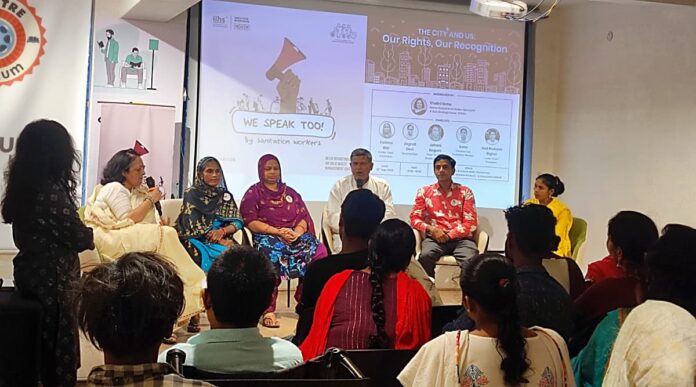When asked about their foremost demands, Jahani Begum, a door-to-door waste collector in Delhi, said they want to be respected and valued for the work they do. She was speaking at the Delhi edition of ‘We speak too, by sanitation workers’.
The event, which concluded the six-part seminar series co-organised in multiple cities by the Indian Institute for Human Settlements (IIHS) and the Alliance of Indian Wastepickers, was held Saturday (September 16, 2023).
Jahani Begum’s was a sentiment echoed by the other four sanitation workers – Fatima Bibi, a public toilet caretaker, Jagruti Devi, a waste picker, Sonu, a contractual worker, and Ved Prakash Bighel, former labour union president – who were also a part of the panel discussion.
Speaking about society’s outlook towards workers, Jahani Begum said that people are often hesitant to touch waste collectors when they visit houses to pick up garbage. “People forget that we are humans after all,” said Jahani Begum.
“Labourers, waste pickers, maids – we are not thought of as humans,” said Fatima Bibi, who recounted a time when she worked as a household maid. “I worked for two months at a house without taking any leave. Even then, my employer complained when I took a single-day leave,” she said.
This societal stigma – ironically more visible towards workers who ensure the cleanliness of personal and public spaces – is visible to the public at large and therefore can still be called out. However, the workers brought to light the other daunting challenges pertaining to their professions and livelihood, the most significant one being the risk to their health and safety.
“Sanitation workers who clean out sewers come in contact with gases like hydrogen sulphide and sulphur dioxide, which can enter through the oxygen pipes and affect the lungs,” former labour union president Ved Prakash Bighel said. He added that even for workers who do not experience immediate health issues, their life span reduces to around 40-45 years owing to regular contact with sewer gases.
However, Bighel said that workers were better protected now with the introduction of bodysuits and other gear, machinery and equipment, along with the training provided to the sewage workers after the regular insistence of the Delhi Jal Board.
Similar to the cleaning of waste, its segregation breeds safety issues too, as Jagruti Devi, a waste picker in Delhi, pointed out. “We have to segregate the waste, which includes harmful materials like injections and glasses, which puts us at risk of getting infected or getting injuries like cuts,” she said while speaking about the hazards she faces in her day-to-day life.
Contractual sanitation workers who are employed by the Municipal Corporation of Delhi (MCD) for cleaning highways face a threat to their lives as well, Sonu, a contractual worker, shared during the discussion. “There are accidents on highways and sanitation workers lose their lives, but there is no compensation provided because they are not permanent employees,” he said.
According to Sonu, these contractual employees under the Public Works Department (PWD) and the MCD are made permanent only when they near the age of retirement, thus denying them the compensation, pensions and medical benefits accrued to regularised employees.
“There are no sick leaves because we are hired on contract. The days we go to work, we get salaries,” Sonu said, adding that if the workers take sick leaves, they miss out on their payment for the day.
Due to these workers’ not being permanent, they are not afforded medical assistance and benefits too, thus leading to them spending an additional amount on medicines and physician check-ups out of their own pockets. “This becomes a double burden for us,” Sonu said during the discussion, adding that the public understands these issues but the government refuses to acknowledge them.
Further, the government awards tenders to private players for sanitation and maintenance work, thus giving rise to a different set of hurdles. “Tenders are given to any company for maintenance, but the actual caretakers are given no support,” Fatima Bibi said.
“Workers get no compensation, insurance, etc. Their salary is around Rs 17,000 but only Rs 10,000 comes down from the contractors to the workers,” Bighel said while speaking about sewer workers.
The privatisation of the sanitation sector also leads to a loss of profession and identity for the workers, especially the waste pickers who are not integrated into the waste management chain. “We have no ID cards for our profession, just the ones provided by the NGOs we are associated with,” Jagruti Devi said.
Most Read
India vs Sri Lanka Live Score, Asia Cup 2023 Final: Mohammed Siraj’s spell helps India win Asia Cup 2023
Ridhi Dogra says it’s ‘unfortunate to play’ Shah Rukh Khan’s mother in Jawan: ‘He told me many times…’
Despite the many troubles they encounter, the sanitation workers continue to fulfil their roles to sustain their livelihood, while standing up for their “right to dignity, right to identity and right to work”, as an audience member pointed out after the discussion.
“My elder daughter is in Class 11 and will be starting college soon which will charge more fees. But we will still educate her and help her in following her dream,” Jagruti Devi answered when asked about her children.
“We are trying to help our children escape poverty, which is why we do this work,” Jahani Begum said. “We are ready to be on the frontline but we want you (the public) to have our back,” she added to a round of applause from the audience.




































